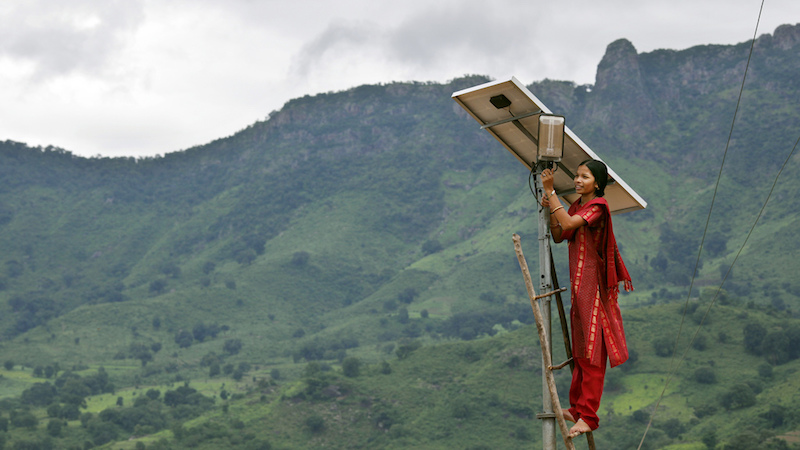This week’s UN climate negotiations in Bangkok begin four months of climate summits that could make 2018 the year that world governments chart a path toward tackling climate change.
But if polluting countries and corporations are successful, ineffectual interventions – like carbon markets and geo-engineering – will become central to the global response to climate change. The result: soaring emissions, lives lost, hundreds of millions of people displaced and species extinction.
This is the path we are on. We are here because of decades of mass deception and political manipulation by big polluters that has allowed them to undermine international, national, and subnational climate policy to guard their profits. This political interference is directly correlated with the emergence of carbon market schemes as a “solution” to today’s crisis, despite their consistent failure.
Carbon pricing – putting a price on carbon and regulating it through markets including cap and trade and offsets (i.e. commodifying the air we breathe) – have been pushed by corporations and global north countries as our fail-safe for the planet.
Carbon markets have not proven an effective way to reduce emissions. Instead of the north making emission reductions domestically, global south companies are given small monetary sums to cut emissions themselves. The resulting “carbon credits” are counted as emission cuts by the north. Instead of holding northern economies accountable to change their production systems and consumption patterns, carbon markets allow for business as usual in the north, leaving the global south to offset the north’s emissions and endure the impacts.
Such schemes are criticized for being rooted in the colonialism and environmental racism that is at the core of fossil fuel extraction. Indigenous peoples, small-scale farmers, forest peoples, youth, communities of colour and women are most impacted by these schemes. For example: Kenya Forest Service guards have violently evicted the Sengwer indigenous people in Embobut forest due to pressures from voluntary international offset schemes that provide financial incentives for forest preservation.
More than ever, the world needs great climate coverage
Become a CHN patron for as little as $7 per month to help us keep bringing you the most in-depth climate politics news from around the world.
We have set up a Patreon account. It’s a simple, safe and easy way for you to become part of a community that will secure and guide our future.
Thank you!
In Colombia, indigenous Wayuu fight for the ancestral rights to land and water due to impacts from the largest open-pit coalmine in Latin America, Cerrejon. Cerrejon has used the Clean Development Mechanism – which lets countries in the global north purchase credits to continue polluting from global south countries – to sell offset credits from a few wind power generators placed next to the looming mines.
Despite the documented failures of carbon market schemes – in addition to the above, the schemes have failed from the EU and Canada, to California and Australia – big polluters are seeking to make these schemes the centrepiece of climate policy at upcoming milestones in Bangkok, San Francisco, and Katowice.
We’re in Bangkok this week: Sign up for daily updates from the talks
At GCAS, they are promoting an expansion of carbon pricing mechanisms that guarantees more fossil fuel extraction, despite needing to keep the vast majority of fossil fuel reserves in the ground to curb temperature rise. At the UNFCCC, the guidelines for Paris Agreement implementation are being used to link up international carbon markets. This creates an official space for polluters to continue polluting unregulated.
These upcoming meetings will chart the immediate future of climate action. Real, just solutions must receive the priority they deserve. We call on governments to listen to the people without delay at the UNFCCC, reject false solutions stemming from GCAS, and to take urgent steps to protect our lives.
Instead of permitting the very actors that fuelled the climate crisis to advance their own agenda, it is time governments embody true climate championship by embracing the meaningful solutions communities on the front lines of climate change already have. They are feasible, affordable and they work.
They include a managed decline of fossil fuel production; pacts to keep fossil fuels in the ground in the global north immediately, with a phase out for the global south; finance and technology transfer; a total and just transition to community-led renewable energy; and a singular focus on keeping big polluters out of climate policymaking.
Asad Rehman is the executive director of War on Want, UK. Meena Raman is legal adviser and senior researcher at Third World Network. Tom Goldtooth is the executive director of Indigenous Environment Network. Nnimmo Bassey is the director of the Health of Mother Earth Foundation. This article was first published on Buzzflash.
Note: A paragraph regarding the UN REDD+ scheme was removed at the request of the authors.
